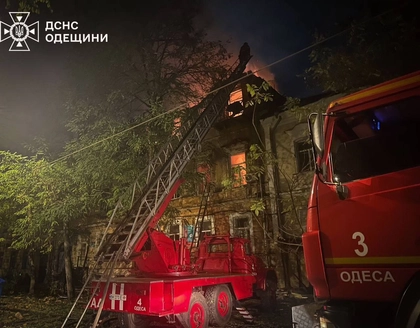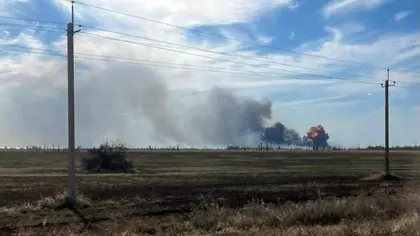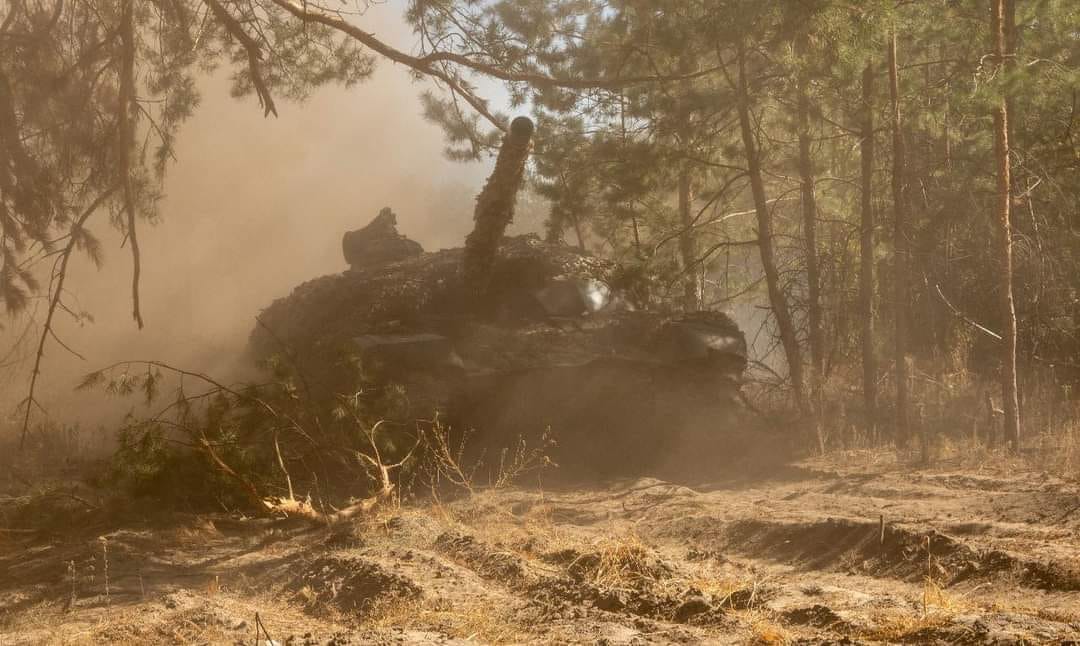New details emerged on Friday, August 12 about a recent series of explosions at a military air base operated by the Russian Federation in Belarus, although but official and independent news platforms were divided on who or what set off the explosions.
Belarusian sources, including state-controlled media, scattered independent media and social media operated by the Belarusian opposition generally, agree that shortly after midnight on August 11 between two to eight explosions, and possibly more, took place at the Zyabrivka military airfield, in south-west Belarus.
JOIN US ON TELEGRAM
Follow our coverage of the war on the @Kyivpost_official.
Located near the town of Gomel and some 20 km from the Ukrainian border, Zyabrivka is operated wholly by the RF military. Since late February the base has been a key launching site for RF missile attacks and air raids against the Armed Forces of Ukraine (UAF) and Ukrainian civilian targets.
The shock from the explosions was reportedly strong enough to rattle windows and shake leaves off trees a kilometer from the air base, and sound of the explosions was audible at least as far as most districts of Gomel, 20 kilometers distant.
Belarusian state-run news agencies said base personnel were conducting a controlled test-firing of an S-300 rocket engine, which burned out of control. There was no damage to base infrastructure and no one was hurt, the official accounts said. An anti-aircraft training exercise in progress at the base, according to those reports, continued as planned.

One Dead, Thousands Without Heating After Russian Strike on Odesa
But Belarusian opposition news platforms were quick to point out that Russian military security at the base bans the entrance of even Belarusian state-controlled media and government officials.
Following the explosions, according to unconfirmed Belarusian independent news reports, Russian security troops placed the base under an effective lockdown, and reinforced Russian patrols were visible at entrances and patrolling the base perimeter. Belarusian social media on the evening of August 11 reported Russian army explosives removal vehicles heading towards the airfield.
Belarusian opposition information platforms, without providing evidence, said the explosions occurred after an estimated eight large anti-aircraft missiles being loaded for transport by Russian troops blew up for unknown reasons. Subsequent explosions were adjacent missiles blowing up in the resulting fire, the reports said.
Belarusian opposition spokeswoman Anna Krasulina in comments to the Apostof web TV channel said that secondary explosions from burning munitions continued for an hour, and called the official version of events – a single test firing gone wrong – “laughable…and absolutely contradicted by the accounts of hundreds of people…who could hear the explosion…going on for a long time.”
According to the opposition Beloruskyi Gayun news platform, the blasts “destroyed a series of vehicles on the air base and located near it.” Equipment ruined included 92H6E and 5H66 radar systems, multiple ammunition storage sites, and a T-72 tank, the site said.
Ukrainian independent media on August 11 confirmed Belarusian reports that Minsk was conducting air defense exercises at the time. Ukraine’s Army General Staff (AGS) in its August 11 situation report noted an increase in RF military activity in Belarus, particularly by IL-76 aircraft transporting S-300 and S-400 anti-aircraft missiles for use by RF forces both in Belarus and Ukraine.
Krasulina claimed that RF IL-76 transport aircraft were present at Zyabrivka airfield at the time of the explosion. In a possible coincidence, on August 9, when a series of probable UAF long-range strikes devastated the RF-controlled Saky airfield in Crimea, IL-76 transport aircraft were likewise operating at the air base at the time of the strikes.
Ukrainian social media and news platforms speculated energetically on possible links between the Zyabrivka explosions and the UAF. Most pointed out the airfield – notorious in Ukrainian defense circles because of hundreds of deadly air and missile strikes launched from there since Russia’s February invasion of Ukraine- is well within the range of UAF artillery and aircraft.
Ukraine Air Force Spokesman Yuriy Ihnat, commenting perhaps tongue-in-cheek on the explosions at Zyabrivka, told Belsat TV he “thanked the Belarusian partisans” who are, he said, “(H)elping” Ukraine very well…We know that they are very kind, smart and resourceful people who are already helping our state, the Armed Forces of Ukraine.” Ihnat offered no evidence Belarusian partisans carried out an attack.
Some patriotic Ukrainian platforms said UAF behind-the-lines saboteurs blew up the air base. Ukraine’s AGS has singled out its special operations infantry units as particularly active and skilled at employing guerrilla tactics in the thickly forested and swampy terrain dividing north-west Ukraine and south-west Belarus. However, Ukrainian army and national leadership have repeatedly stated UAF ground troops as a matter of state policy do not and will not operate outside Ukraine’s borders.
Belarusian President Aleksandr Lukashenko as of midday Friday, August 12, had made no public comment on the Zyabrivka explosions. Ukrainian military analyst Oleh Zhdanov said that Minsk’s primary goal in the Russo-Ukrainian war is to stay in power and out of the conflict. At present the safest strategy for Belarusian President Aleksandr Lukashenko is to allow Russian military presence in Belarus, without sending regular Belarusian troops into Ukraine, Zhdanov said, in comments to the UNIAN news agency.
Up to 13,000 Belarusian former police and military personnel of Belarus, as well as OMON special operations police officers, have signed agreements to serve in the RF army to fight against Ukraine, said Oleksii Hromov, deputy head of the Main Operational Directorate of the General Staff of the Armed Forces of Ukraine, in a statement made on Thursday, August 11.
“The main motive is material and financial. Fear and money are the main factors of the Russian military presence,” Hromov said.
You can also highlight the text and press Ctrl + Enter






